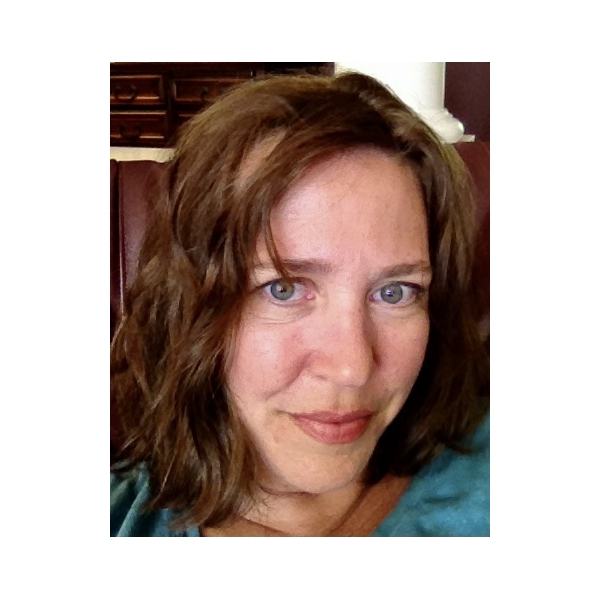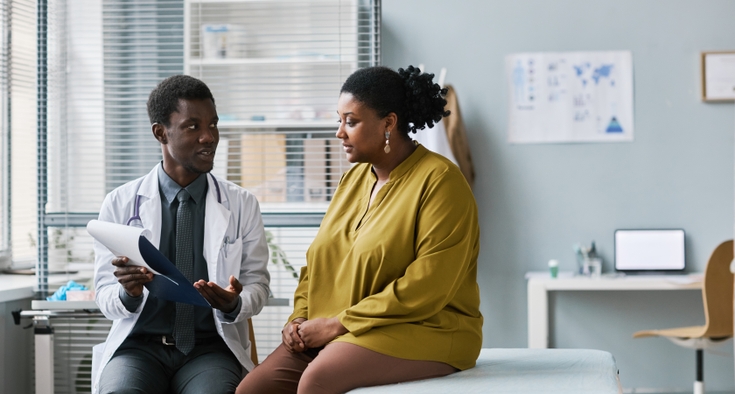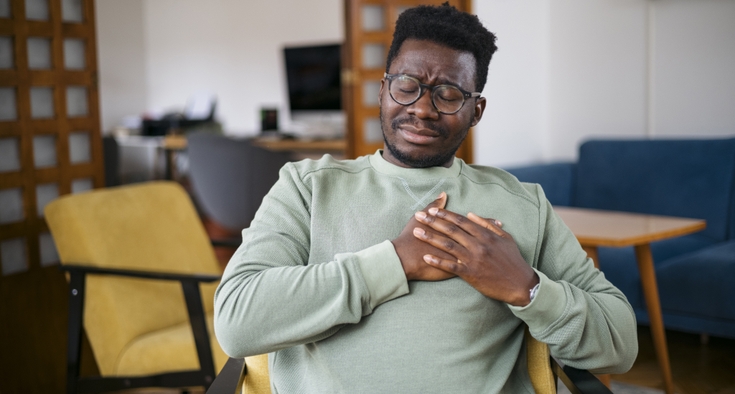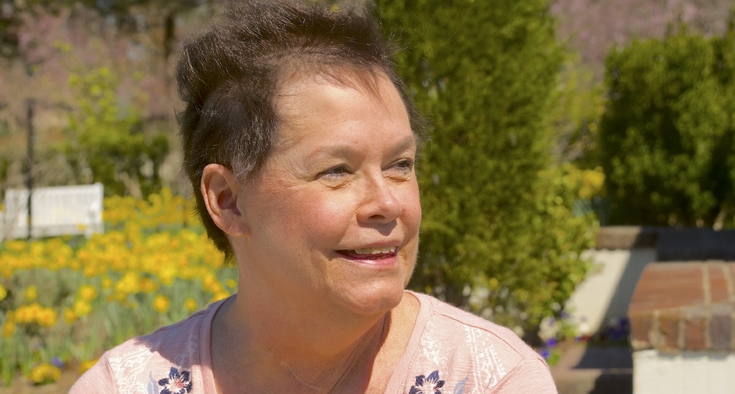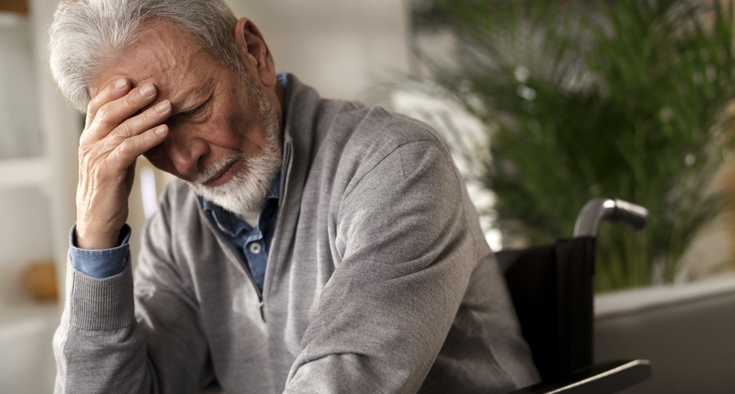Hypertension, or high blood pressure, affects tens of millions of adults in the U.S. Known as “the silent killer,” hypertension often exists without warning signs or symptoms.
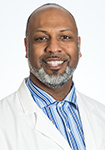
“Most people with high blood pressure aren’t even aware of it,” said Dr. John Card, an internist at Novant Health Adult Primary Care Harper Hill in Winston-Salem. “Some may eventually experience fatigue, headaches or chest pains — but many remain symptom-free until they experience a significant health crisis.”
Detecting and treating high blood pressure early is an important part of overall health, and can help prevent life-threatening conditions, including:
- Heart disease and heart attack
- Stroke
- Chronic kidney disease
- Vision loss
Also, because blood pressure affects blood flow to the brain, hypertension in midlife has been linked to dementia and impaired cognitive function later in life.
Good health starts with a visit to a primary care physician.
What is blood pressure?
"The arteries deliver blood from the heart to other parts of the body,” Card said. “When clinicians take patients’ blood pressure, they are measuring how much pressure the blood is putting on the walls of the arteries. Too much pressure can cause damage to the arteries over time.”
Blood pressure is measured using two numbers:
- Systolic blood pressure — the first (sometimes referred to as the “top”) number — represents the pressure in your arteries when your heart beats.
- Diastolic blood pressure — the second (or “bottom”) number — shows the pressure in your arteries between heartbeats.
What steps can I take to control my blood pressure?
“Prescription medications are usually prescribed to help control high blood pressure, but lifestyle changes can also be very successful,” Card said. “In fact, for 20% of people with hypertension, nonpharmaceutical tactics may be the only treatment necessary.”
While this has nothing to do with sodium, Card recommends kicking a habit that will improve your heart health: “If you smoke, it’s important to start working on quitting.”
Interested in learning more about natural ways to help reduce and manage your blood pressure? Here are the five strategies Card recommends most often:
1) It’s not the salt shaker. It’s processed foods.
Sodium contributes to high blood pressure. Putting away the salt shaker is fine — but it’s usually not the main culprit, Card said.
“That’s because salt and sodium are not the same thing,” he said. “Salt contains sodium, but sodium is also found in other foods, including some that don’t taste salty.”
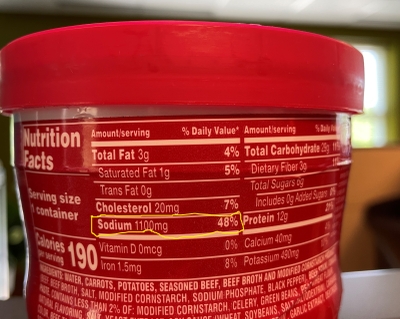
In fact, when ranking where Americans get most of their sodium, table salt doesn’t crack the top 10.
You may be surprised to learn that high amounts of sodium are in:
- Breakfast cereals
- Ice cream and candy bars
- Bread and bakery products
- Canned soups. Check this sodium content on this popular brand of vegetable beef soup many of us might heat for lunch.
How much sodium is too much? Ideally, most adults should aim to consume about 1,500 milligrams — and no more than 2,300 milligrams — each day, according to the National Institutes of Health. But many of us take in more than 3,400 milligrams a day.
2) Dish up a colorful diet.
Many websites tout foods like watermelon, citrus fruits, almonds and yogurt as blood pressure remedies. While some could potentially be helpful, more research is needed to prove they work, Card said.
“The good news is that many of these suggestions actually mirror the way we encourage patients with high blood pressure to eat, such as moving toward a diet with lots of colorful produce, whole grains, healthy fats and smaller portions of lean protein,” he said.
As a guideline, Card recommends the DASH diet, which is similar to a Mediterranean eating pattern. The DASH diet has been clinically proven to reduce systolic hypertension and prevent blood pressure-related illnesses.
3) Cool down with a glass of water.
Drinking water with added lemon juice or apple cider vinegar is another popular folk remedy for controlling blood pressure. But does it work?
“There’s some evidence that drinking water, with or without added ingredients, could be helpful in lowering blood pressure,” Card said. “But the acidity in lemon juice and vinegar may not be helpful for people with digestive issues like reflux disease.”
Ultimately, taking a break to drink some water may be as beneficial as the beverage itself.
“In that moment, your mind can let go of the problems and stressors that raise your blood pressure,” Card said. “So you’re staying hydrated and allowing your system to calm down.”
Top scores for safety in NC
Novant Health received the most ‘As’ for patient safety in North Carolina from The Leapfrog Group. With a focus on safety, quality and patient experience, the national, industry-leading nonprofit, evaluates and assigns letter grades ranging from A to F to hospitals across the country. Novant Health’s hospitals with “A” grades outperform 70% of hospitals nationwide for safety and quality.
4) Rest, relax and rejuvenate.
Our bodies need rest and relaxation to stay healthy. So Card encourages patients to seek out activities that make them happy, like watching funny movies or going out with friends. He also suggests taking a few moments during the day to sit quietly, do some stretches or simply imagine a favorite place.
“Getting enough sleep on a regular basis is also important,” he added. “Inadequate or irregular sleep is associated with elevated blood pressure. But good, restorative sleep helps the body relax, which lowers blood pressure.”
5) Add more movement to your day.
Many of us spend our workdays sitting in front of computers, but our bodies need to move.
“Exercise raises your heart rate, which helps get your blood flowing consistently throughout the body,” Card said. “After a workout, your blood vessels actually relax. Plus, moving more means you’re likely to sleep better.”
He recommends working up to a total of 30 minutes of activity five days a week. Choose activities you enjoy, like going for a walk or bike ride, taking a yoga or Tai chi class, or just dancing around the house to your favorite music.
Talk to your doctor about other options
If natural methods aren’t resulting in lower blood pressure, it’s important to talk with your healthcare clinician about other steps you can take.
“In that situation, I would probably suggest blood pressure medication,” Card said. “But that doesn’t necessarily mean you’ll always need it. If your blood pressure levels improve, we might consider reducing or even discontinuing the medicine.”




